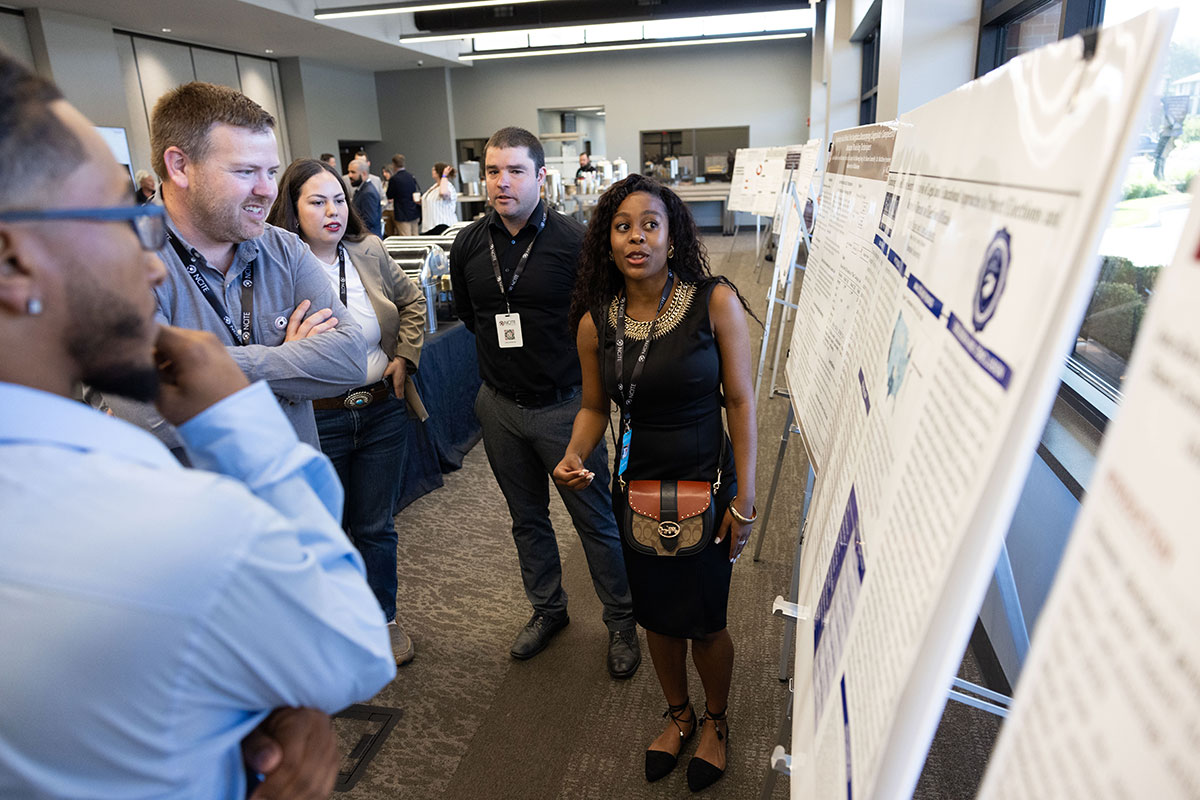ENVISION24 Conference Showcases Rising Talent with Student Posters
At NCITE's recent ENVISION24 conference, students from the consortium participated in a poster competition, presenting their work to an audience of fellow researchers and government practitioners.
- published: 2024/07/10
- contact: NCITE Communications
- email: ncite@unomaha.edu

By Penjani Banda (NCITE Student Communications Specialist)
Within the realm of counterterrorism, a new generation of talented intellects is starting to emerge. Young, bright minds armed with fresh perspectives and innovative research are bringing new ideas to the table.
In June, NCITE hosted its second in-person ENVISION conference at the Scott Technology Center in Omaha, uniting counterterrorism experts from academia, government, and the private sector. As attendees made their way into the conference, they passed an array of student research posters.
As part of the conference, NCITE hosted a poster contest, allowing students from diverse academic backgrounds across the consortium to share their research to an audience of fellow academics and national security professionals. These posters – the culmination of hours of dedicated work and effort – offered a glimpse into the future of counterterrorism research.
The conference featured 11 student poster presentations from five different schools. Three posters received awards:
1. Cecelia Gordon (Oklahoma University) won the Scientific Innovation Award. Her research focused on new methodologies that can be used to analyze and visualize social media data. Gordon’s poster showcased her findings on overcoming complex linguistic data using advanced text analytic techniques.
2. Emma Theobald (University of Nebraska at Omaha) won the Modernization of Data Award. Her research sought to determine if AI can generate more harmful ideas compared to human creativity. Theobald presented her findings, which indicated that, although AI prevented malevolent idea generation, it made ideas more original and harmful when used as an information gathering and evaluation tool.
3. Callie Vitro (University of Nebraska at Omaha) won the Accessibility Award. Vitro’s research examined sentencing for federal ISIS cases in the U.S. Findings showed that leadership is an important factor affecting how long someone is sentenced.
Commenting on her win, Vitro remarked that presenting her work was one of the most exciting aspects of the ENVISION conference.
“I feel very lucky just to have been able to discuss my research with incredible researchers and practitioners over the course of the conference,” Vitro said. “This work, with (NCITE researchers) Austin Doctor, Seamus Hughes, and Camden Carmichael, stemmed from the pure curiosity and invigorating conversations we have here at NCITE, and it has been very rewarding to see the project begin to come to fruition.”
View the Winning Posters
Scroll through the window below to view the winning posters.Anthony Roberson, NCITE research specialist overseeing the student poster submissions, described the event as successful, noting its role in enabling students to share their work and interact with conference attendees.
"The poster presentation provided students an opportunity to showcase their research and network with government stakeholders,” Roberson said.
Ares Boira Lopez, research specialist at NCITE, and Joseph Stewart, a graduate student at Oklahoma University, both presented posters.
Boira Lopez said the conference created a platform for students to interact and learn from each other’s disciplines and approaches, potentially fostering partnerships and collaboration on future research projects.
Getting to see topics that other students specialize in – such as law enforcement, criminology, and political science – expands our understanding of different perspectives and opens up a world of research ideas and opportunities,” she said.
Stewart echoed these sentiments.
"Seeing what other students are working on has been insightful,” he said. "Aside from that, communicating our research findings to stakeholders helps us understand how they can be implemented to provide meaningful deliverables.
Sam Hunter, Ph.D., head of strategic initiatives at NCITE and Regents-Foundation professor of psychology at the University of Nebraska at Omaha (UNO), emphasized the conference’s role in facilitating interactions among students and fostering in-depth discussions on diverse research topics.
"ENVISION provides a unique opportunity for folks to have informal, candid, in-depth conversations about the nature of the work that is occurring at different universities and get a sense of the research landscape across these institutions," Hunter said.
Tin Nguyen, Ph.D., senior research associate at NCITE described the conference as an invaluable experience that broadens students’ perspectives on real-world application of research.
"The ENVISION conference exposes students to a diverse array of research topics that are studied at the consortium, including the types of data sources we use, the methods we use, and the challenges that come with conducting all of this research,” Nguyen said. “The students get to hear, at the level of practice, the implications of this research."